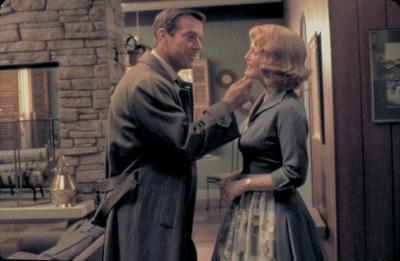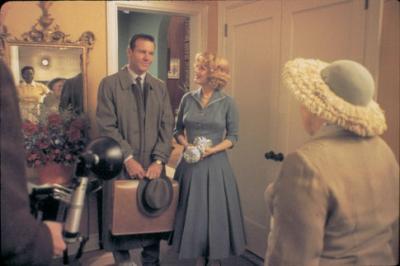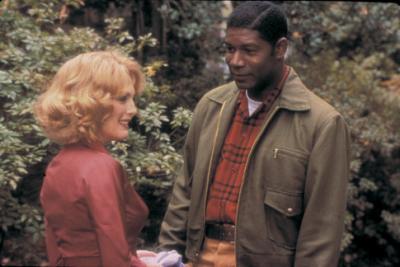Far From Heaven
Quite far from having any kind of point to it as well.

Julianne Moore picked up an Oscar nomination for her performance here as Cathy Whitaker, a well to do Connecticut housewife and socialite, spending her days devotedly raising her two children, little David and little Janice, devotedly doing some sterling organisational work for local good causes and of course devotedly attending to her husband, Frank (Dennis Quaid). Frank is a successful and therefore busy salesman for Magnatech, a company vaguely described as making home consumer goods of some nature, and clearly doing well for himself or possibly stealing stuff from his work, judged on the basis of his house, packed to the gunnels with all the latest in fifties gadgets and fashions. Indeed, it would appear that the entire town this drama plays out in was constructed overnight in 1957 with nary an item from the past appearing therein. This is clearly a conscious decision on the part of Haynes, intending the movie as a tribute to Douglas Sirk, a noted director of melodramas. To my knowledge I haven't seen a movie from Sirk, so I can't judge how effective it is on that score. However, from the movies of the era I have seen, certain techniques are effectively stolen (or paid tribute to), such as the crane shots showing parts of the neighbourhoods at the start and close of the movie. The sets and fashions look very much like a portrayal that would be found in a fifties film, which is not to say they seem tremendously realistic. It's difficult to see where the line is drawn here between homage and pastiche, the styles and certain characters herein are so hackneyed and cliched as to tend more to be a parody of the era than a tribute.
For the first quarter hour or so of the film, Cathy, her kids and her circle of close friends wend their way down the path of life I'm informed from seemingly all sources as being idyllic, for the timeframe. Her whole life is so sugar coated as to send diabetic members of the audience into hyperglycaemic shock, and frankly I was wishing for a good Cuban Missile Crisis to come along a shade early to wipe the smile off these people's faces. A sign of the times perhaps, but I find something deeply disturbing and suspicious about people wandering around grinning inanely at everything and everyone as though they've been taken from a school 'Dangers of ecstasy' propaganda video. Little David's near continual addressing of his father as 'Pop' is near-guaranteed to have you wishing an untimely death on the brat. Thankfully, this syrupy existence is disturbed when Cathy takes a meal to her husband supposedly working late in his office only to walk in on him in a 'compromising situation' with another man.

According to the film, homosexuality is viewed more as a disease than a lifestyle choice, with Frank attending psychology sessions with a doctor to try and stamp out this filthy perversion, eschewing some of the more extreme correctional methods such as electroconvulsive therapy. Shocking (hahahaha, I slay me!) to think this kind of thinking could ever dominate a social landscape. This seems to works for a time, with family life bearing some resemblance of normality, although Frank is transferring his problems into his growing alcoholism while still finding it difficult to muster any physical attraction to his wife.
Cathy cannot tell anyone about this, fearing the scandal it would cause amongst her gossipy circles. Unusually, she can open up to someone from outside her social circle; her gardener Raymond Deagan (Dennis Haysbert). He has recently taken over duties from his deceased father, in addition to running his own gardening supply shop. He has a degree in business studies, appreciated fine art and is clearly a thoughtful and intelligent man. He's also black.
This causes problems for Cathy, or more accurately creates gossip to scandalise the neighbourhood after she is seen (gasp!) talking to these....Negroes, clearly a strange and different breed to the god-fearing white folks. I was under the impression that the areas around Connecticut were the more racially tolerant areas at the time, but lets play along for now. While Cathy clearly feels something more than just friendship for Raymond, in the face of criticism from all fronts including Frank, Cathy terminates Raymond's employment and vows never to see him again. Things seem to be returning back to normality again, despite Frank being told to take a month off work for R&R, caused by (although hinted rather than stated) his continued alcoholism. Cathy and Frank take a trip to Miami with this time for a well-deserved holiday. It's here that Frank suffers a relapse of his 'illness', catching the eye amongst other things of a young lad. Again, in keeping with the feel of the movie, these darker issues can never be spoken of outright, only hinted at. Indeed, in the one occurrence of swearing in the movie when Frank rebukes his wife the film seems to derail as though Cathy cannot process this depravity until Frank apologises, allowing the narrative to continue. A small moment occurring early on in the film, but does much to set the tone for the film.
Cathy's world falls apart as Frank breaks down and realises the pointlessness of his situation, divorcing Cathy to set up a new life with his lover. Given the importance society as it's portrayed here places on keeping up appearances it's a startlingly brave move on his part, although if the film were claiming to have any basis in reality it's far more likely society's general repression would have kept him in a loveless marriage until his children had grown up and left home. This would seemingly leave her free to explore her feelings for Raymond, however he has felt the negative effects of breaking a taboo too as both he and his daughter are targeted by both the black and white communities for his social transgressions. Sadly, his only solution is to leave town and set up a new life elsewhere, such is the stifling repression of the era. Perhaps the characters now lead more honest lives, but at a heavy cost. The film leaves us with little hope that any of the characters will lead happy lives after the credits finish rolling, on studied reflection it's quite the bleak little character study, albeit a particularly well acted one. Moore invests Cathy with a believable representation of a fifties movie character trying to deal with events alien to her sphere of knowledge, although as a portrayal of fifties life the movie a few liberties. Haysbert imbues Raymond with a certain quiet dignity and Quaid is effective both in his role as 'Pops' and as a man on the edge of a breakdown, tortured by desires he feels ashamed by.

I see what Haynes is trying to do - make a fifties film dealing with issues from that timeframe in the way that they would have been dealt with in the fifties if studio execs would have allowed that kind of controversy back in the day. What I cannot understand is why on earth he's trying to do it, and why I should care about it. Perhaps he feels this is a huge gap in the canon of fifties cinema and he must redress the balance, but it seems more like an exercise in ego stroking. It clearly has no pretensions at being a documentary, the reactions of pretty much everyone in the movie are ridiculously overwrought, as befits a melodrama. The sets, cinematography and Elmer Bernstein's score try their best to seem as though they were pulled directly from a fifties film, as the occasional risk of parodying themselves. Berstein picked up an Oscar nomination for his score, however I found myself noticeably irritated by it at numerous points.
The techniques used at points seem self-indulgent; such as any shots of people driving having badly matted filmstock rolling by in the background, not doing a great job of convincing anyone, as was the case in most of the efforts of the era. But why does it do this? Difficult to answer, perhaps it is to make screamingly obvious to the viewer that this is supposed to look like an old movie rather than be a convincing depiction of the fifties, although to my mind it looks glaringly tacky and hurts the atmosphere more than it helps.
As a work of cinema judged in today's world, this really says nothing about the nature of it's supposed subjects, and I think everyone is aware that modern culture is more tolerant of homosexuality and race relations, despite the sadly widespread and numerous problems in both areas. Is the purpose of the film to show we've gained this freedom by losing the urge to continually be incredibly polite to everyone; paid for freedom with foul language? Surely not, but it leaves me struggling to see the movie as anything other than a nicely shot and nicely acted character study as it would probably have been played in fifties movies, almost a caricature of a caricature.
Were I in the business of passing quantifiable judgements, I'd have to award this 2/5 TippyMarks.
Dennis Quaid (Frank Whitaker)
Dennis Haysbert (Raymond Deagan)